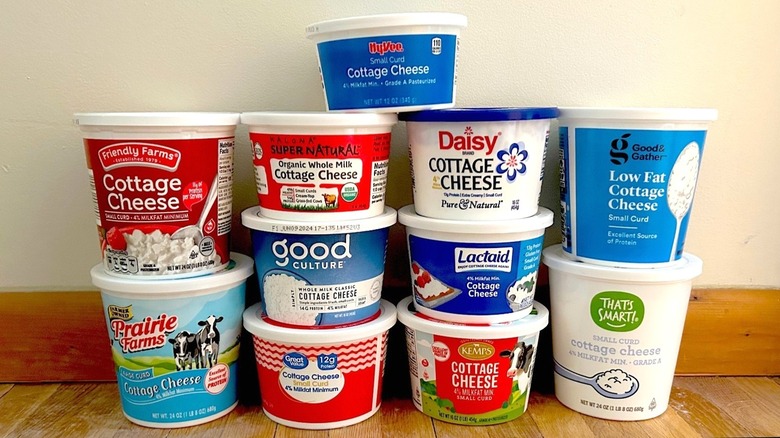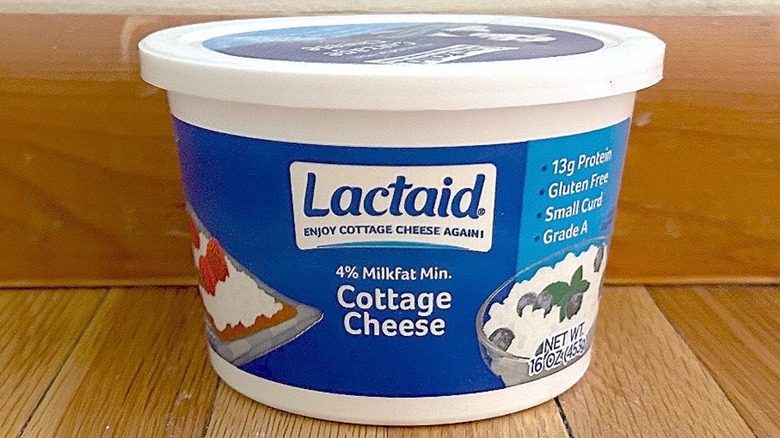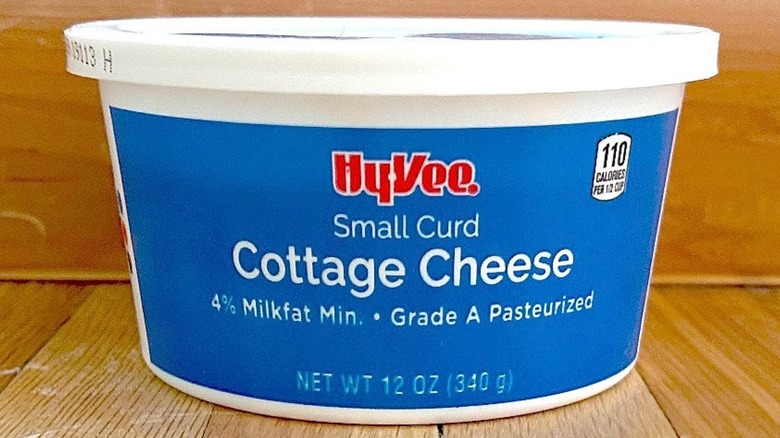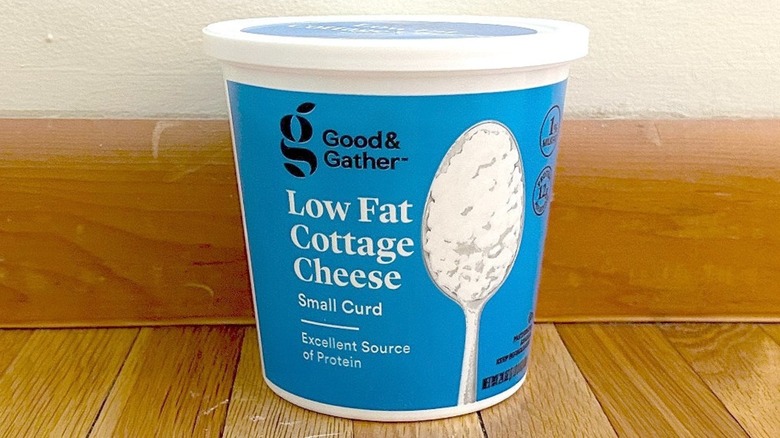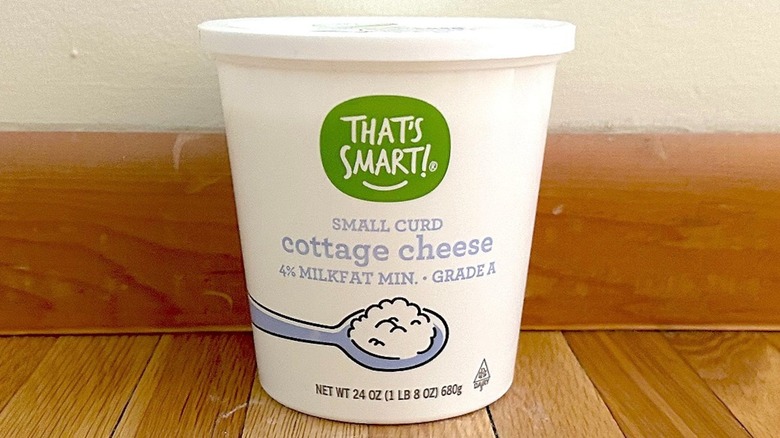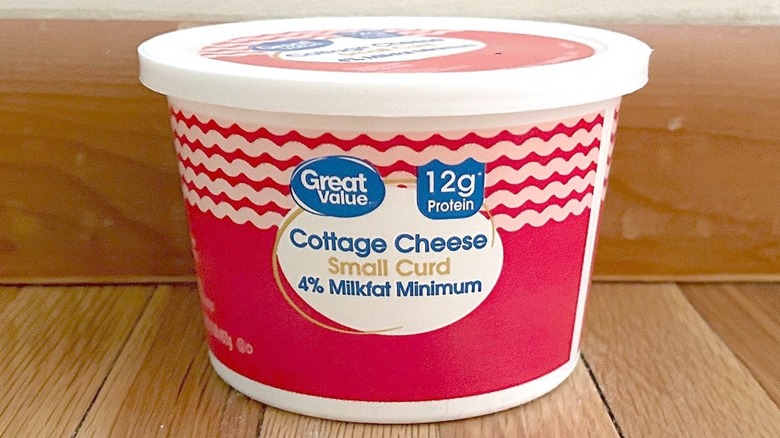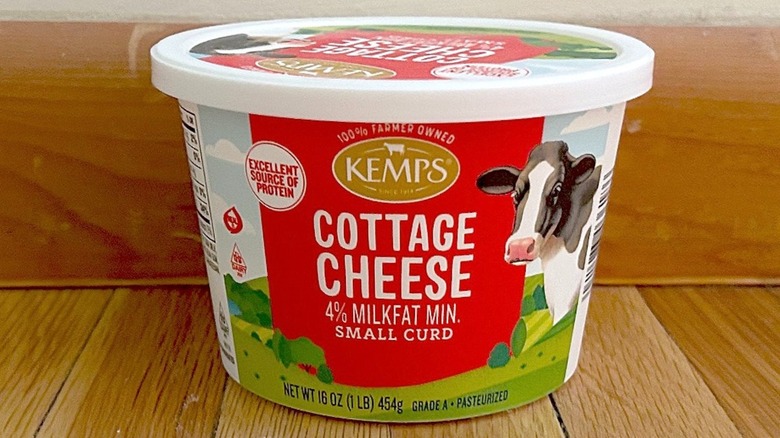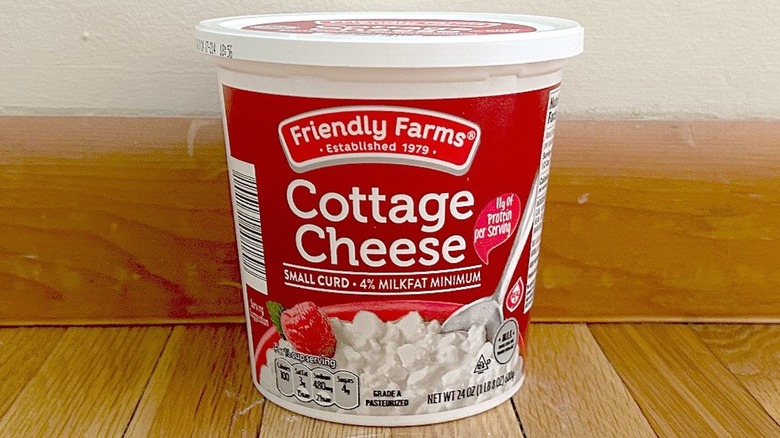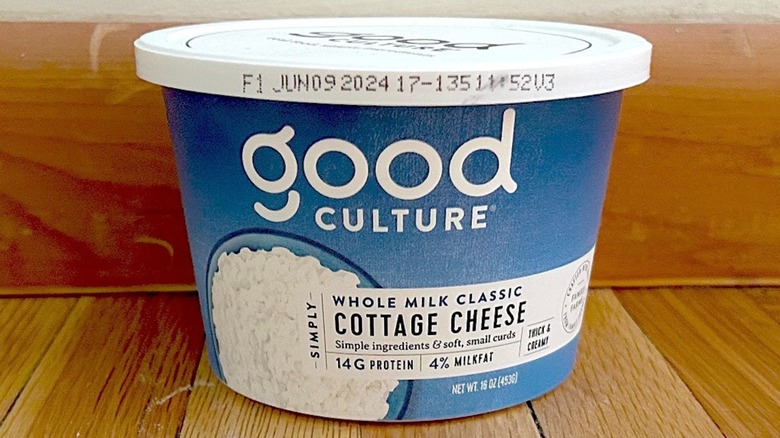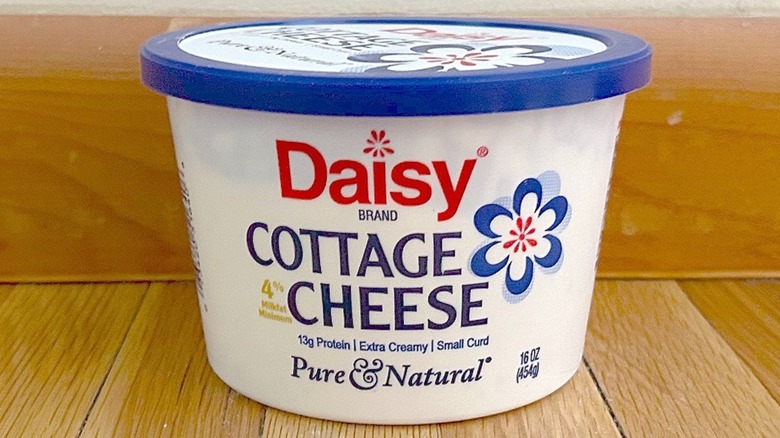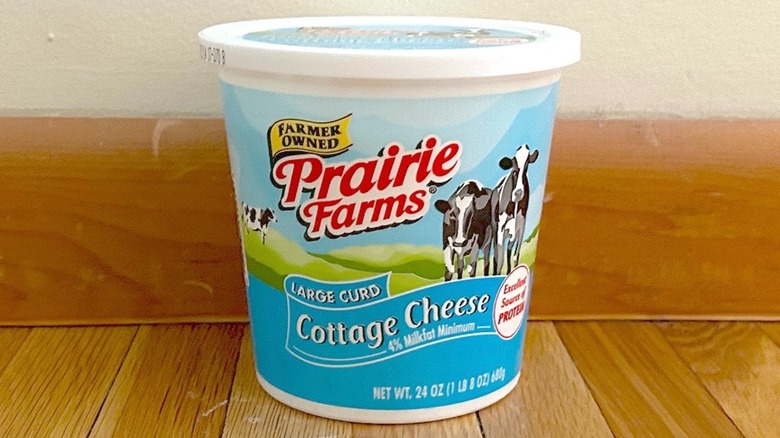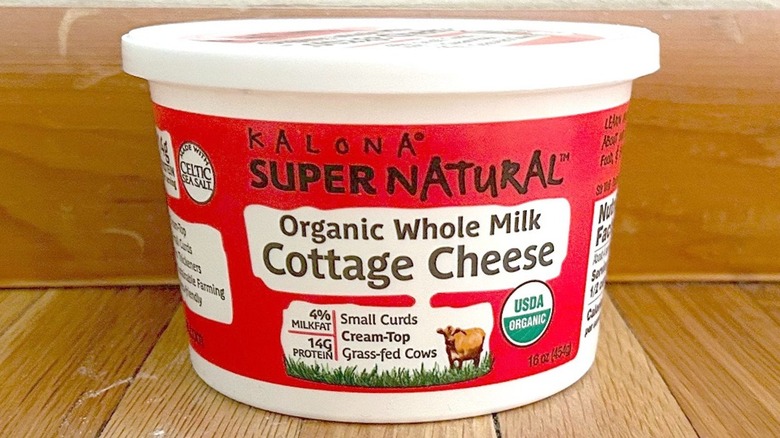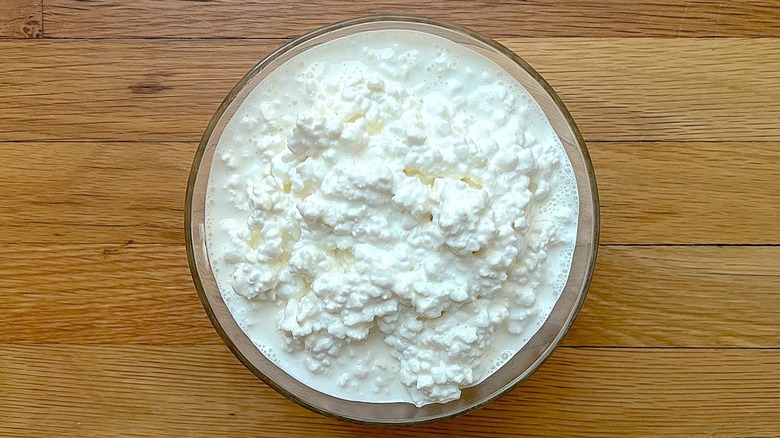The Ultimate Ranking Of Cottage Cheese Brands
If you have been paying attention to the internet lately, you may have noticed that cottage cheese has been making something of a comeback. This fresh cheese, made by adding an acid or live, active cultures to cow's milk before the curds are separated from the whey, rinsed, and seasoned with salt, can be used in many ways, from adding a fluffy texture to scrambled eggs to being a tangy alternative to mayonnaise in your next batch of egg salad. With so many different varieties available for purchase, including small and large curd iterations and those with different levels of fat content, it can be daunting to decide which brand of cottage cheese to add to your culinary repertoire.
That's where I come in. As a chef, I am picky about what type of cottage cheese I use in recipes needing a hint of tart flavor and creamy texture or a boost in probiotic or protein content. To help narrow down the playing field of cottage cheese brands competing for valuable real estate space in my refrigerator, I decided to purchase as many brands as I could find. When possible, I bought 4% milkfat, small curd varieties of each brand and evaluated these based on aroma, texture, and flavor. For more information on my criteria for ranking the quality of these cottage cheeses, check out the methodology I used at the end of this article. For now, read on to see which cottage cheese brand ranks supreme, in my expert opinion.
11. Lactaid Cottage Cheese
Ranking in last place among cottage cheese brands is the 4% milkfat small curd offering from Lactaid. The mildly lactose-intolerant part of me really wanted to love this cottage cheese because it has lactase enzymes added to it to help break down the lactose sugar in the milk into glucose and galactose, rendering it more readily digestible for sensitive stomachs. Unfortunately, there were some issues with this product that I couldn't get past.
First, this cottage cheese has a very thick, tacky texture, likely a result of the added emulsifiers and binders, like xanthan gum, locust bean gum, and guar gum, that homogenize the product but contribute to a less than pleasant mouthfeel. The curds are uneven in size, with some being on the larger side. This isn't a deal-breaker, but it is something I noticed in a number of the products I sampled, and it may impact the types of recipes you would use them in.
The biggest issue with this brand is the sweet flavor that lacks any element of that quintessential tangy quality that makes cottage cheese so distinct. It masks any added salt and lingers on your tongue in an almost synthetic way. For me, this makes it less palatable for eating as-is. The one place this cottage cheese might shine is in dessert recipes or as an ingredient to boost the protein in your favorite breakfast smoothie.
10. Hy-Vee Small Curd Cottage Cheese
Coming in second to last among cottage cheese brands is the 4% milkfat small curd variety from Hy-Vee. This store-brand product highlights one of the idiosyncrasies of cottage cheese: its inconsistent flavor, texture, and appearance. When I opened this container, there was so much liquid it almost looked like cottage soup. While it's not uncommon for some whey to settle in a container of cottage cheese, this was excessive.
The curds themselves were unevenly sized, with many of them being on the large side. When I sampled the cottage cheese, the liquid overwhelmed the curds, giving this product a diluted, virtually flavorless quality, with just a hint of residual sourness lingering on my tongue. The only reason this brand did not land in last place is that it at least basically resembles cottage cheese, lacking that cloying quality that characterized the Lactaid variety. That said, I would not purchase this one again.
9. Good & Gather Low Fat Cottage Cheese
Among store-brand products, Target's Good & Gather line tends to be consistent, so I was surprised that this cottage cheese landed where it did on this ranking. The only variety available when I went to the store was the 1% milkfat small curd iteration. Typically, the fat percentage of cottage cheese does not make a huge difference in flavor so much as it does in texture, particularly when you are adding it to recipes, like as a substitute for ricotta in a homemade lasagna. This was precisely the case here.
There was a significant amount of excess whey in the container, though nowhere near as much as the Hy-Vee brand. The curd size was all over the map, with the curds lacking structural integrity, practically dissolving on my tongue the second I put them in my mouth. I tend to like cottage cheese that has some bite to it, making it more satiating when you eat it. These curds were more like lumpy cream than cheese. The flavor and aroma were on the sweet side, with just a hint of tanginess. Overall, I found this cottage cheese to be underwhelming. I can only assume that the 4% milkfat version would be somewhat more flavorful and have a slightly firmer texture, though the way the curds are formed should not vary markedly.
8. That's Smart! Small Curd Cottage Cheese
Next on the list is the 4% milkfat small curd variety from the discount brand That's Smart! This cottage cheese had a similar issue as the previous two in terms of the texture being on the runny side, though the liquid in this container was notably creamier, rather than like water or whey. This made it less off-putting and might actually be to the liking of those who enjoy a looser cottage cheese.
The aroma of this brand had a sweet milkiness to it that was quite pleasant. The curds, though inconsistent in size, were firmer in texture, giving them a more characteristically cottage cheese-like mouthfeel. Where this variety was less impressive was in flavor. The acidity was notably faint, with the milk dominating. If you were planning on using cottage cheese in baking or to make a protein-rich snack, the lack of tartness might be appealing. For my money, its absence was a deterrent from wanting to purchase this brand again.
7. Great Value 4% Milkfat Small Curd Cottage Cheese
Walmart's Great Value brand might be cost-effective, but the quality of its 4% Milkfat Small Curd Cottage Cheese underwhelmed me. While there was nothing overtly wrong with this brand, it was just bland. It lacked any kind of flavor, notably salt, though you would never know it based on the 400 milligrams of sodium per serving added to this cottage cheese.
What bothered me more than the overly subtle flavor, which was at least modestly creamy, was the texture. This cottage cheese, like many of the others, contains a number of gums as binders. These binders do a good job of commingling the liquid with the curds in the container, but they are a bit heavy-handed. The result is something dense and a bit more pasty than I typically enjoy. There is a fine line between cottage cheese that is naturally rich versus one that is artificially bolstered to be thick. That line was crossed with this cottage cheese.
6. Kemps Cottage Cheese
The 4% milkfat small curd offering from the Midwestern staple that is the Kemps brand ranks next on this list. This brand stands out as being one with excessive sodium, containing 470 milligrams, which is 20% of the recommended daily value, per serving. The salinity is notable in the flavor of this cottage cheese as well, though it's not necessarily overwhelming to your taste buds.
What was most distinct about this cottage cheese was its texture. Initially, when I opened the container, there was no liquid, just densely packed curds. When I dug into the cottage cheese, it turned out there was an air pocket at the bottom of the canister where any excess liquid had settled. Once I stirred the contents well, I was still rather shocked at how dense the cottage cheese was. It resembled ricotta cheese, having very fine curds that were quite chewy. I didn't hate this, but it wasn't what I anticipated from cottage cheese. In some ways, this product reminded me of the curds that form when I make homemade mozzarella from scratch.
This density makes Kemp's cottage cheese a good contender for adding to recipes where excess moisture would be a deterrent, like meatloaf or juicy, protein-packed meatballs. For eating as-is, it may be a bit too thick without diluting it a bit with some applesauce or fresh fruit.
5. Friendly Farms Cottage Cheese
Aldi lovers will be pleased to see Friendly Farms' 4% milkfat small curd offering listed here in this ranking. No doubt this is a solid brand in terms of flavor and texture. Unfortunately, it wins in one category that is unenviable. It has the highest sodium content of any cottage cheese I tried, at 480 milligrams, or 21% of the recommended daily value, per serving. Ironically, in this case, the salt is not overtly present in the flavor of this cottage cheese, which is creamy and has a notable, but not aggressive, tartness that is very pleasant.
What I particularly enjoyed about this brand is the texture. The curds are uniform in shape and consistently distributed throughout the liquid in the container. While I prefer my cottage cheese without binders, they were well-utilized in this product, achieving that homogeneity that gives this brand a luxurious mouthfeel that is not artificially rich or heavy-handed. For price and texture, this is a good cottage cheese. I just wish the sodium levels were more in line with the other brands, and that it didn't contain those binders. These are the reasons it did not break into the top four on this ranking.
4. Good Culture Organic Whole Milk Classic Cottage Cheese
Good Culture's Organic Whole Milk Classic 4% milkfat small curd cottage cheese ranks in fourth place. This brand has a lot to love. It has a relatively low sodium content at 340 milligrams per serving, a high protein content at 14 grams, and is made without any additional binders or preservatives. It also boasts live and active cultures that are purportedly good for your gut microbiome.
The first thing you note when you open the container is how thick this cottage cheese is, despite lacking those binders. The curds are tiny, and there is little excess liquid, much like ricotta cheese. The flavor of this cottage cheese has a mild tartness and well-balanced salinity. This, too, reminded me of the base used to form fresh mozzarella balls after the curds have separated from the whey. If I had one critique, I'd argue this cottage cheese is just a bit too thick, but the pros definitely outweigh the cons. I could definitely see myself purchasing this one again and using it as a substitute for cream cheese atop my favorite everything bagel.
3. Daisy Cottage Cheese
It likely won't surprise anyone to see Daisy's 4% milkfat small curd cottage cheese land in the top three of this ranking. This brand consistently performs well in taste, texture, and overall quality. This is no less true here, though I was a bit surprised at the size of the curds, considering this is supposed to be a small curd product. The curds were on the large side, more akin to other large curd varieties. This wasn't a deal-breaker but notable nonetheless. The texture is far creamier and moister than many of the others, though not soupy, like some of the lower-ranking brands.
In terms of taste, this brand is quite tart and has a distinct saltiness that is pronounced but not overkill. I will say that the amount of tang does somewhat mask the natural creaminess of the cottage cheese, which may or may not be to your liking. For my taste buds, I appreciate the burst of acidity and think it makes this cottage cheese lend itself to being incorporated in recipes like pancakes, quick breads, or other baked goods that could use a lift and a boost of protein.
2. Prairie Farms Large Curd Cottage Cheese
In second place on this ranking is Prairie Farms' 4% milkfat large curd cottage cheese. This was a case where I was unable to find the small curd in the higher milkfat content, so I decided to compromise, and I'm quite glad I did. Among the more common brands that are available at many grocery stores, this one is a dynamite cottage cheese. It has a distinctly rich, creamy flavor reminiscent of the whey from the cheesemaking process. Though less salty, it has a pleasant acidity that shines through without overwhelming your palate.
The texture of this cottage cheese is where I was most smitten. Despite the fact that the curds were larger, they were inconsistent in size, with many resembling the small curd varieties I sampled. Each curd had a bit of a squeak to it, like those you would find atop the perfect, heaping plateful of authentic poutine. This is a characteristic that is completely unique to this brand, and something I absolutely loved. Though there is liquid in the container, the curds retain their individuality even when immersed in the creamy liquid. For me, this cottage cheese was a resounding success.
1. Kalona SuperNatural Organic Whole Milk Cottage Cheese
If I had to name the Cadillac of cottage cheeses, Kalona SuperNatural would be that brand. Indeed, its organic 4% milkfat small curd cottage cheese lands in the top spot on this ranking for a reason. Kalona is a premium brand and costs a bit more, but if you can afford it, it's worth the investment. This cottage cheese has no binders or additives and contains some of those gut microbiome-boosting probiotic strains. It also comes with a luxurious layer of cream on top, which may surprise you the first time you open a container of this cottage cheese.
Once you stir the contents of the container, you are left with an unctuous product dotted with small, relatively consistently sized curds. Though I am hesitant to use this description, the best way to describe the flavor of this cottage cheese is fatty — but in the best possible sense of the word. The milkfat coats your tongue like a velvety hollandaise sauce, with just a hint of salt and the slightest tang lingering in the aftertaste. And, though not as noticeable as the Prairie Farms brand, the curds have a hint of that delectable squishy quality that I so love. This cottage cheese is a home run.
How we determined the best cottage cheese brand
In an attempt at obtaining a well-rounded selection of cottage cheese brands, I visited half a dozen major grocery stores within a 30-mile radius of my home. The varieties I sampled are reflective of nationally available name brands, store brands, and a couple that may be uniquely available to those residing in the Midwest.
Though I wanted to review only products that had 4% milkfat and were of the small curd variety, there were a couple of instances where these were unavailable. In the interest of wanting to include these brands, I made exceptions and noted this in the ranking for full transparency.
My overall rankings were based on aroma, texture, flavor, nutritional content, cost, and overall quality. While I attempted to remain objective, there are some characteristics of cottage cheese that I tend to be discerning about. When these came into play, I noted them as best as I could. I hope this will help to inform your purchasing decisions the next time you find yourself stocking up on cottage cheese.
